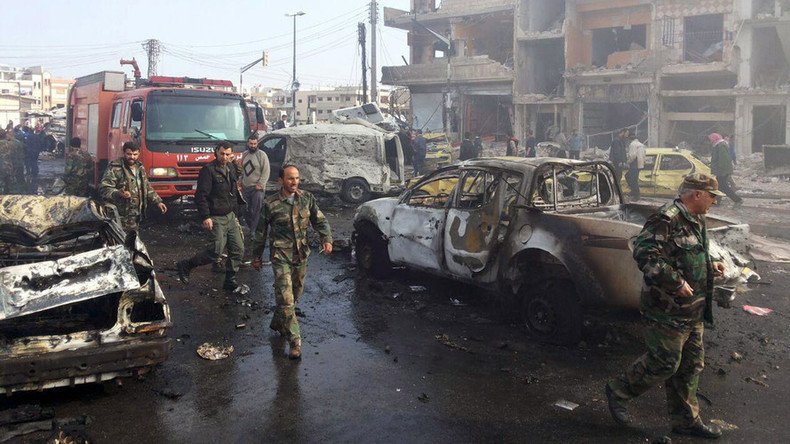Syria bombings: ISIS attempting to 'reshuffle deck of cards to regain momentum'

The latest terror attacks in Syria are an attempt by Islamic State to sidetrack and interrupt progress that has been made, or can be made, to settle the crisis diplomatically, international relations professor Paolo von Schirach told RT.
RT: Islamic State (IS, formerly ISIS/ISIL) said it's behind the Sunday blasts. The group is currently under intense pressure from Syrian government troops. Are those things linked?
Paolo von Schirach: Yes, clearly they look at the possibility of any successful counter-offensive coming from the Syrian government, now backed by Russia and other allies, combined with the diplomatic efforts going on in parallel between Russia and the US...Secretary [John] Kerry was in Oman just [yesterday], announcing the possibility for a provisional ceasefire. This could be [a] new sort of tightening around IS, that they cannot play the divisions of the other side – meaning Assad fighting against other insurgents, disagreements between the US and Russia; that if there is a combined front against them, they stand to lose. Therefore these acts of terror, to me, look like attempts to divert attention, to recreate tensions and to reshuffle the deck of cards in order to regain momentum.
RT: The blasts coincided with intense Syrian peace talks between Russia's foreign minister and the US secretary of state. Is there a link?
PvS: I would say so. Again, nobody really knows exactly, but it seems to me that IS needs to regain the initiative. They are under pressure, maybe not enough pressure, according to many analysts. [As for] the American actions, the air war has been long, incoming, and very slow in execution. But then you have now the Russian presence in Syria supporting Assad, and there are Iranian-supported Shia militias in Iraq tightening against IS in Northern Iraq. So the momentum of the war seems to be shifting. To the extent that indeed Russia and the US – who are clearly the biggest players in this whole situation – can find a modicum of accord, this doesn’t look good for IS in the long term.
'Syrian paradox'
The latest attacks in Damascus were a result of IS responding to gains made by the Syrian army near Aleppo, political analyst Max Abrahms told RT.
RT: Islamic State says it's behind the blasts. The group is currently under intense pressure from Syrian government troops. Do you see a connection?
Max Abrahms: I wouldn’t say that there is a direct connection. This conflict has been going on for a long time. IS is the enemy of the Syrian government, and IS guys have killed a lot of Assad supporters. The Syrian Army has [also] killed a lot of ISIS guys. But things are indeed escalating over the past week; the Syrian army has made inroads against IS near Aleppo [and] recaptured a number of villages, and now IS is responding.
But these places where IS is attacking – both north and south of Damascus – have been struck before numerous times, including within the past month or so. I am not at all surprised to see this. But clearly things are escalating. We appear to be seeing a bit of a paradox, because IS is actually getting weaker in Syria by all sorts of objective measures that political scientists use to measure militant group capability, but at the same time IS fighters are getting through. We’re seeing more violence directed around the Damascus area.
RT: You said that they are getting through. How difficult is it to stop that from happening? Is there any way that suicide attacks can be prevented?
MA: It is very difficult. Think about it – these people are willing to give up their life. So it is very hard to stop them, it is very hard to deter them. And political scientists have found, unsurprisingly, that if you look back throughout history since around 1970, the most lethal terrorist attacks tend to be suicide attacks, because the perpetrators can go where there is a big mass of people, and then simply detonate themselves. These sorts of strikes are very hard to stop.
The statements, views and opinions expressed in this column are solely those of the author and do not necessarily represent those of RT.












